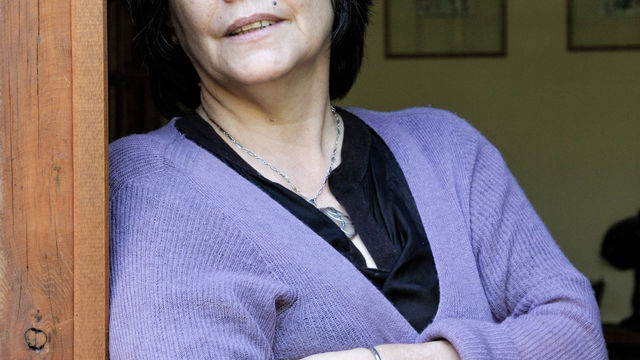
Diamela Eltit
The Chilean writer and artist Diamela Eltit was born in Santiago in 1949. She obtained a degree in literature from the Universidad de Chile in Santiago, has taught in schools in Chile and abroad, and is currently Distinguished Global Professor in Creative Writing in Spanish at New York University. Eltit turned to the visual arts, specifically art actions, in the late 1970s, when she formed—along with the poet Raúl Zurita, the sociologist Fernando Balcells, and the artists Lotty Rosenfeld (b. 1943) and Juan Castillo (b. 1952)—the group CADA (Colectivo de Acciones de Arte). From 1979 to 1983 CADA staged multiple art actions in Santiago's working-class neighborhoods and at art institutions to disrupt the authoritarian order established by the dictatorial regime of Augusto Pinochet. During her years with CADA, Eltit performed and recorded for the video camera a series of actions titled Zonas de dolor (Zones of pain). In Zona de dolor I, from 1980, Eltit is seen washing the sidewalk in front of a brothel on Maipú Street while reciting the text of her unpublished novel "Por la patria" (later published as Lumpérica). She edited the video to begin with images of her lacerated arms and legs. The video Zona de dolor II, from 1981, shows Eltit kissing a homeless man. The brief encounter is marked by sexual and class tensions further heightened when she leans back and the man begins kissing her more intensely. Eltit's actions contrast with those of CADA in that she approaches art actions as a way to explore womanhood, gender, and marginality rather than solely as an institutional and political critique.
She has also coauthored other video projects, including Con frio, con lluvia, con calor (With cold, rain, heat) and El padre mio (My father), both from 1986. Eltit has always felt a great affinity for the visual arts, particularly during the Pinochet regime, as an outlet to express her views on social and political issues. An important contributor to the cultural debates that challenged the military dictatorship, Eltit has published widely in journals, including Revista de crítica cultural, and in the books Lumpérica (1983), El infarto del alma (Heart attack of the soul; with photographs by Paz Errázuriz, 1994), and Emergencias: Escritos sobre literatura, arte y política (Emergencies: Writings about literature, art, and politics, 2000). Many of her novels have been adapted for the theater and published in translation. Eltit was awarded a John Simon Guggenheim Memorial Foundation Fellowship (1985) and a grant from the Social Science Research Council (1988); she has also received numerous other awards and appointments. From 1991 to 1994 Eltit served as Chilean cultural attaché to Mexico. In 2013 Princeton University acquired her archive, which includes manuscripts, letters, and photographs.
—Marcela Guerrero
Selected Works of Fiction
1983 Lumpérica
1991 La vaca sagrada
1994 Los vigilantes
1998 Los trabajadores de la muerte
2002 Mano de obra
Selected Bibliography
Carreño Bolívar, Rubí. Diamela Eltit: Redes locales, redes globales. Madrid: Iberoámericana, 2009.
Green, Mary. Diamela Eltit: Reading the Mother. Woodbridge, UK: Tamesis, 2007.
Morales T., Leonidas. Conversaciones con Diamela Eltit. Santiago: Cuarto Propio, 1998.
Norat, Gisela. Marginalities: Diamela Eltit and the Subversion of Mainstream Literature in Chile. Newark: University of Delaware Press, 2002.
Polgovsky Ezcurra, Mara. "Zona de Dolor: Body and Mysticism in Diamela Eltit's Video-Performance Art." Journal of Latin American Cultural Studies: Travesia 21, no. 4 (2013): 517–33.


